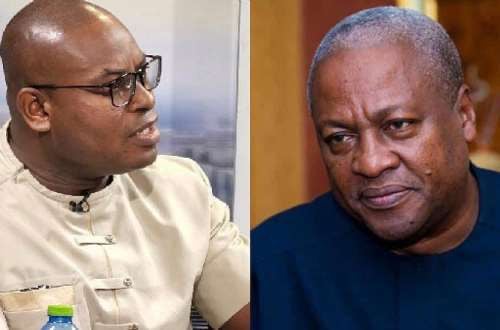Richard Ahiagbah, the National Communications Director of the New Patriotic Party (NPP), has launched a scathing attack on the current administration led by President John Dramani Mahama, accusing it of exacerbating the illegal mining crisis, commonly known as galamsey, since assuming power in January 2025. Ahiagbah contends that the government’s inaction, particularly its failure to repeal Legislative Instrument (L.I) 2462 and declare a state of emergency, has allowed the environmental devastation caused by galamsey to escalate. He points to President Mahama’s campaign messaging during the 2020 and 2024 elections, suggesting that the current state of affairs is a consequence of promises made or implied during those campaigns. Ahiagbah’s criticism centers around the perceived lack of urgency and decisive action from the Mahama administration in addressing what he describes as a worsening crisis for Ghana’s forests and water bodies.
Ahiagbah’s assertions echo concerns raised by other critics, including Kofi Bentil, Senior Vice President of IMANI Africa. Bentil argues that galamsey has effectively been legitimized under the Mahama-led National Democratic Congress (NDC) government. He cites L.I 2462, the Environmental Protection (Mining in Forest Reserves) Regulations, 2022, as evidence of this claim. This legislation has drawn significant criticism from environmentalists and civil society organizations who argue that it weakens protections against mining in forest reserves. Bentil’s statement that “Galamsey is now de facto legal” reflects a deep-seated concern that the current regulatory framework, rather than curbing illegal mining, inadvertently facilitates it.
The core of the criticism leveled against the Mahama administration revolves around the perceived disconnect between their rhetoric and actions regarding galamsey. While acknowledging the seriousness of the problem, critics argue that the government has failed to implement effective measures to combat it. The inaction on repealing L.I 2462, a regulation seen by many as enabling rather than preventing illegal mining in protected areas, is particularly highlighted. The calls for a state of emergency, a measure that would grant the government extraordinary powers to address the crisis, have also gone unheeded, further fueling the perception of a lack of commitment to tackling the issue.
The controversy surrounding L.I 2462 stems from its provisions, which some interpret as allowing for regulated mining activities within forest reserves. While proponents of the legislation may argue that it provides a framework for controlled and sustainable mining, critics fear that it creates loopholes that can be exploited by illegal miners. The argument revolves around the difficulty of effectively monitoring and enforcing regulations in remote forest areas, making it challenging to distinguish between legal and illegal operations. The concerns raised highlight the complex interplay between economic interests, environmental protection, and regulatory efficacy in the context of resource extraction.
The accusations against the Mahama administration are not limited to legislative inaction. Critics also point to a perceived lack of enforcement of existing laws against illegal mining. This perceived lack of enforcement is seen as a contributing factor to the escalating environmental damage. The argument is that even if stricter regulations are in place, their effectiveness is undermined if they are not rigorously enforced. The calls for a state of emergency are partly motivated by the belief that it would empower the government to take more decisive action against illegal miners, including deploying greater resources for enforcement and prosecution.
The debate over galamsey in Ghana highlights the complex challenges faced by resource-rich developing countries. Balancing the economic potential of resource extraction with the need to protect the environment and ensure sustainable development is a delicate act. The accusations against the Mahama administration underscore the importance of transparency, accountability, and effective governance in managing these competing interests. The ongoing controversy suggests that addressing the galamsey crisis will require a comprehensive approach that involves not only legislative reforms but also robust enforcement, community engagement, and a commitment to sustainable development practices. The ultimate goal is to find a path that allows for economic development without compromising the environment and the well-being of future generations.


